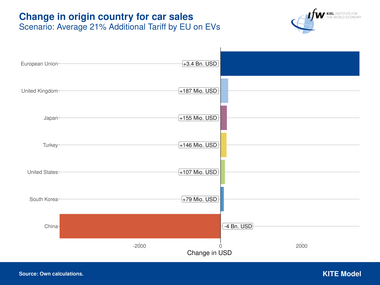Statement
Countervailing Duties: EU Shows Strength Against China’s E-Vehicle Subsidies

“After a thorough review of China’s subsidy practices, the European Commission has decided to impose countervailing duties averaging 21 percent on Chinese electric vehicles, in addition to the existing 10 percent tariff. Specific tariff rates for individual manufacturers highlight the targeted nature of this review, aimed at addressing distortive subsidies.
The introduction of these duties will have significant effects. Recent calculations using the Kiel Institute KITE model indicate that the EU’s total tariffs, amounting to approximately 31 percent on Chinese electric vehicles, could lead to a reduction in imports of electric vehicles from China by around 25 percent. This corresponds to a value of about 4 billion US dollars.
A recent study by the Kiel Institute has estimated the scope of Chinese industrial subsidies, currently amounting to over 200 billion euros per year. These subsidies distort competition and can fundamentally justify countermeasures by the EU. The latest decision demonstrates the European Union’s (EU) determination to ensure fair competitive conditions in the European market.
However, the expected increase in electric vehicle prices will make the climate transition more expensive. Finding the right balance between fair competition and promoting green technologies remains a key challenge.
Germany’s support for the EU Commission’s measures is of great importance. It is crucial that Europe presents a united front on this issue and does not allow itself to be divided. Only through a cohesive stance can the EU effectively defend its interests.”
Simulations based on the Kiel Institute’s KITE model. The results show the medium- to long-term trade impacts that will emerge permanently as new trade structures and supply chains are established. Short-term disruptions are not accounted for in the model.



